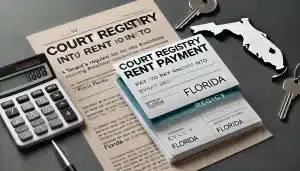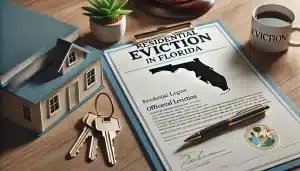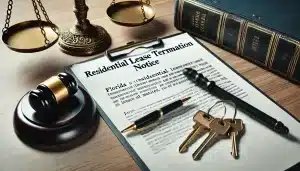Table of Contents
Landlord Notice Requirements for Residential Lease Termination and Security Deposit Claims in Florida
Navigating Florida’s landlord-tenant laws can be complex, particularly when terminating residential leases or addressing security deposit issues. As a landlord, following the correct legal procedures is crucial — not only to protect your property rights but also to avoid costly litigation. This comprehensive guide outlines essential landlord notice requirements in Florida and ensures you are fully prepared for any situation involving eviction or lease termination.
Understanding Florida Landlord Notice Requirements
Under Florida law, landlords must follow specific protocols when giving notice to tenants. Failing to do so can result in losing an eviction case, being required to return security deposits in full despite damages, and even facing penalties.
If you’re involved in disputes or evictions, consulting with a specialized attorney, like John M. Jorgensen at Scott, Harris, Bryan, Barra & Jorgensen, P.A., can be invaluable.
3-Day Notice for Nonpayment of Rent
When a tenant fails to pay rent, Florida law requires landlords to serve a 3-day notice demanding payment or the tenant’s surrender of the property.
Key Requirements:
- Clearly state the amount owed and the specific due date.
- Do not include late fees unless defined explicitly as rent in the lease.
- Exclude weekends and legal holidays in the 3-day calculation.
For example, if you deliver notice on a Friday, the 3-day period begins Monday unless it’s a holiday, in which case it begins Tuesday.
Best Practices for Delivering a 3-day Notice:
- Hand-delivery or posting the notice in a conspicuous place at the rental property, typically on the door.
- Always photograph the posted notice for evidence.
Common Mistakes to Avoid:
- Including unauthorized charges in the notice.
- Incorrect date calculations.
Termination of Month-to-Month Tenancy
Month-to-month leases, whether verbal or written, provide flexibility — but they still require proper notice for termination. Landlords must deliver written notice at least 30 days before the end of the monthly rental period.
Proper Notice Example:
- If notice is given on January 2nd, termination is effective at the end of February.
Recommended Delivery Methods:
- Hand delivery
- Posting notice prominently at the residence
- Certified mail (least preferred due to potential delays or disputes)
Common Pitfalls:
- Late notice delivery.
- Failing to document delivery clearly.
Addressing Nonmonetary Defaults with a 7-Day Notice
Nonmonetary violations, such as breaches of lease terms unrelated to rent payments, require a 7-day notice. This includes damages, health or safety code violations, or other breaches.
Types of 7-Day Notices:
- Curable Violations: Tenant has 7 days to correct the issue.
- Non-curable Violations: For serious breaches or repeated violations within 12 months, landlords can terminate without providing a cure period.
Critical Steps:
- Clearly outline the violation.
- Specify if the violation is curable.
- Provide precise deadlines for compliance or lease termination.
Mistakes to Avoid:
- Insufficiently detailing the violation.
- Improper notice delivery method.
Security Deposit Claims Under Florida Law
Managing security deposits requires strict adherence to Florida statutes. Landlords must clearly document claims or promptly return deposits to avoid legal repercussions.
Timeline Requirements:
- Return deposits within 15 days if no claim is made.
- Provide written notice of a claim within 30 days if withholding funds.
Notice Delivery Method:
- Certified mail only, sent to the tenant’s last known address.
If the landlord fails to comply, they forfeit the right to claim the deposit and may have to cover tenant attorney’s fees in court disputes. Even if a claim isn’t filed in a timely manner, landlords can separately sue for property damage.
Frequently Asked Questions (FAQs)
How do I legally evict a tenant in Florida?
Proper notice must first be given (e.g., 3-day or 7-day notices). If unresolved, landlords can file an eviction lawsuit. For a detailed guide, see our comprehensive resource: Navigating Florida’s Eviction Process: A Comprehensive Guide for Landlords and Tenants.
Can late fees be included in a Florida eviction notice?
Only if explicitly defined as additional rent within the lease agreement.
How long does a landlord have to return a security deposit in Florida?
15 days if no claims are made; within 30 days if claiming deductions.
Security Deposit Disputes: Tenant’s Right to Object
Tenants have 15 days from receipt of a claim notice to dispute it in writing. If there’s disagreement, landlords and tenants should attempt a resolution to avoid costly court proceedings, as the prevailing party may recover attorney’s fees.
Importance of Legal Assistance
Incorrect landlord notices can jeopardize your legal rights and lead to unnecessary financial loss. Hiring experienced legal counsel ensures your actions comply fully with Florida landlord-tenant laws.
For experienced guidance, contact the attorneys at Scott, Harris, Bryan, Barra & Jorgensen, P.A. We assist landlords across West Palm Beach, North Palm Beach, Jupiter Farms, Singer Island, Loxahatchee, Tequesta, and throughout Palm Beach County.
Need Expert Help?
Facing an eviction or security deposit dispute?
Schedule a consultation today with Scott, Harris, Bryan, Barra & Jorgensen, P.A. Our experienced landlord-tenant attorneys will ensure your rights are protected every step of the way.
Related Resources:
- Landlord / Tenant Disputes Attorney Practice Page
- Navigating Florida’s Eviction Process: A Comprehensive Guide for Landlords and Tenants
Conclusion
Properly handling lease termination notices and security deposit claims protects landlords from potential legal consequences and ensures smoother transitions during tenant disputes. Always follow Florida’s strict notice requirements and consult with specialized landlord-tenant attorneys when necessary.
For trusted guidance on Florida’s landlord-tenant laws, schedule a consultation with John M. Jorgensen at Scott, Harris, Bryan, Barra & Jorgensen, P.A. — committed to protecting your property rights and interests.












